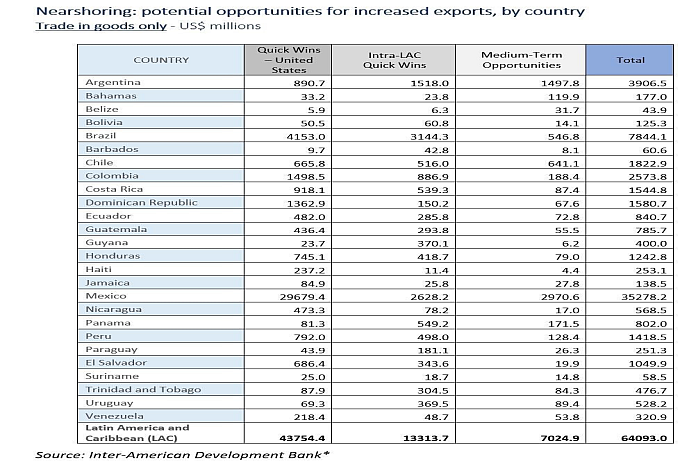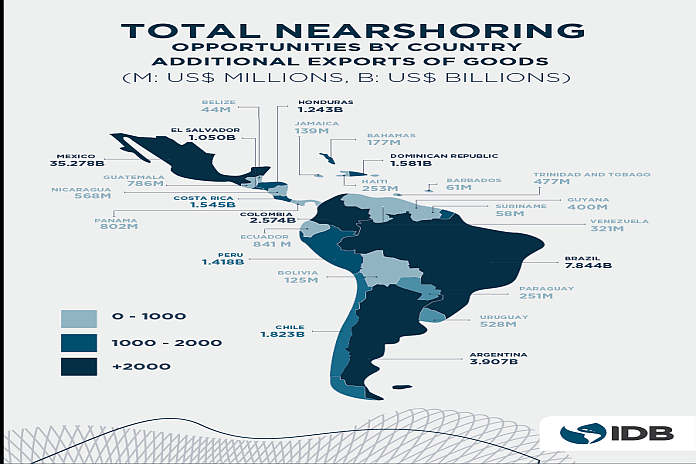-
-
- Estimate was provided to trade ministers and private-sector leaders gathered to discuss commerce and investment opportunities in the Americas
- Meeting included key trade agenda issues: global value chains, digital commerce and climate change
-
LOS ANGELES, USA – Nearshoring could add an annual $78 billion in additional exports of goods and services in Latin America and the Caribbean in the near- and medium-term, with opportunities for quick wins in the auto industry, textiles, pharmaceuticals, and renewable energy, among others, according to estimates by the Inter-American Development Bank (IDB).
Mexico and Brazil would see the biggest gains, though all countries would benefit from nearshoring, according to data contained in a forthcoming study. The $78 billion includes $64 billion in exported goods and $14 billion in services.
The estimate was provided to senior government officials from Latin America and the Caribbean, including ministers of trade and foreign affairs, and senior executives from companies of the Western Hemisphere, who gathered to analyze options for taking advantage of the opportunities provided by the reconfiguration of global supply chains, trends in trade sustainability and climate change, and the increasing digitalization of economies.

The meeting of ministers and chief executive officers, which comes ahead of the Ninth Summit of the Americas, represents an important effort by the IDB to promote economic recovery through the collective action of countries, in close cooperation with the private sector.
“Increased environmental concerns, along with the health crisis and the recent invasion of Ukraine by Russia, has presented an opportunity in which the region can contribute to the global economy and the fight against inflation by taking a more active role in global supply chains in a way that is sustainable and equitable,” said IDB president Mauricio Claver-Carone.
Supporting the reconfiguration of global value chains is a priority of the IDB’s Vision 2025 plan to accelerate the economic recovery and growth of Latin America and the Caribbean.
“This meeting is a demonstration that leaders, from the public and private sectors, can put aside their differences to find ways to create jobs and improve the wellbeing of our citizens – and trade is one of the main avenues to accelerate our prosperity,” he added.
Private-Sector participation
The meeting aimed to deepen understanding on key trade issues. More than 100 companies took part, with panel interventions by executives from firms such as Gap Inc., UPS, Cintora, Citibank, Amazon Web Services, Stripe, and Microsoft.
Myron Brilliant, executive vice president and head of international affairs at the US Chamber of Commerce, provided a private-sector view on trade, as part of the Americas Business Dialogue (ABD), which brings together companies from all sectors and countries in the Western Hemisphere, with the IDB acting as coordinating entity.
The ABD is presenting a report to heads of state gathered in Los Angeles, with concrete recommendations and specific indicators to measure implementation.
Global value chains
Recent studies indicate that the participation of firms in global value chains (GVC) brings multiple benefits, in addition to traditional gains from additional trade and investment. Participation in GVC increases productivity through transfers of technology and knowledge and creates jobs and more opportunities for women. An increase of 10% of a country´s participation in GVC increases its per capita GDP by 11-14 percent.
For the region to take advantage of opportunities that come with increased participation in GVC, the IDB recommends countries focus on a “3i” strategy: investment, infrastructure and integration.
- Investment: Countries should increase efforts to attract investment, including by making improvements in the business climate and in the capacity of investment- and export-promotion agencies. The IDB estimates that each dollar invested in investment promotion produces almost $42 in direct foreign investment.
- Infrastructure: Improving infrastructure in trade, connectivity, transportation and logistics in the region is key to ensure firms are cost-competitive. A ten percent reduction in international shipping costs increases the value of exports by at least 30 percent, according to IDB estimates.
- Integration: The region must deepen and modernize its regional integration to lower trade friction and boost competitiveness. This includes redoubling efforts to converge and harmonize more than 33 preferential trade agreements in the Americas. This harmonization would result in an increase in intraregional trade of nearly 12 percent.
In addition, the region must increase the availability of financing for companies, particularly to enable small and medium-sized firms to connect with international markets.
Climate change and digital commerce
Ministers also discussed the importance of sustainability and trade. According to IDB calculations, internal greenhouse-gas emissions in Latin America and the Caribbean to produce goods for external consumption contributes 20 percent of total emissions that cause global warming – a significant number, but somewhat below average global emissions linked to trade. Countries must work together to protect the environment, while maintaining an open posture on international trade.
On digital trade, participants discussed the importance of creating a regulatory framework that would facilitate the creation of a digital marketplace and attract investment. Digital transformation would enable more firms to export services consumers want, such as remote learning and telemedicine. Digital tools can also improve the capacity of government entities that facilitate trade, such as customs and trade promotion agencies.
The IDB and its private-sector arm, IDB Invest, can act as a catalyzer to help generate additional funding, including financing from other multilateral organizations, and mobilize resources from the public and private sectors. In addition, the Bank can develop and offer innovative financial and non-financial products, such as blended financing, guarantees, and technical assistance, as well as resources from other public and private-sector donors.
“In the IDB, you will have our full support for the path you build going forward and in future meetings to implement policies that contribute to inclusive and equitable growth,” said president Claver-Carone to meeting participants. “What is discussed here translates into jobs, into wealth-creation and, above all, hope for millions of our citizens who yearn for a better future.”





